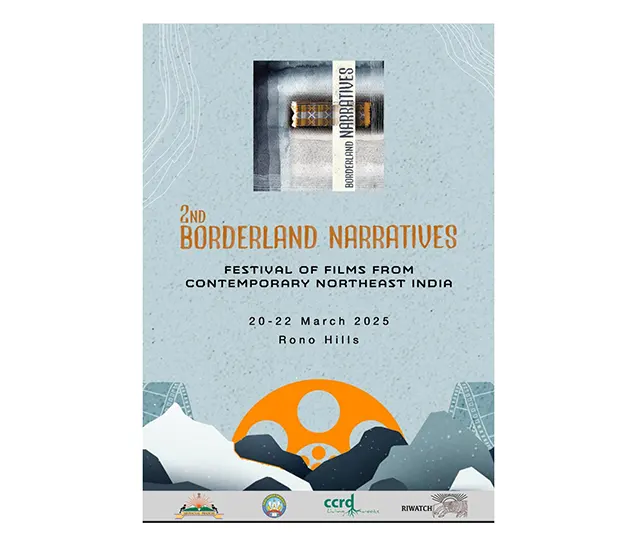ITANAGAR, 22 Feb: The mass communication department of Rajiv Gandhi University (RGU), in collaboration with the Arunachal Institute of Tribal Studies (AITS), is all set to host the 2nd edition of Borderland Narratives: Festival of Films from Contemporary Northeast on 20, 21 and 22 March in Rono Hills.
The festival has been conceptualised with a view to provide a platform to filmmakers from the region to explore issues of heritage, identity and change from a contemporary perspective and share it with a larger audience.
“While the Northeast of India, with the diversity of its communities and cultures, has always been considered a ‘paradise’ for anthropologists, ethnographers and documentary filmmakers, much of the way in which it has been represented has been from the perspective of the ‘endangerment’ of cultural heritage. Be it tourism festivals or texts in popular media, much of the way the region is seen situates it in the past, as the home of ‘rich traditional culture’. Even documentary films mostly fall back on this image of the Northeast as it goes about documenting the cultures of the communities”, said a press statement.
“However, in recent times, there has been a move towards changing this discourse of representation and looking at the Northeast as it is today. Filmmakers, and a body of young researchers as well as artists, are beginning to explore the contemporary face of the communities in the region. Their work centres around the idea of a narrative that consists of what the communities of the region are going through in the current context and what issues concern them today. We see, in these emerging films, the ‘traditional practices’ and ‘ritual performances’ give way to newer ways of looking at society itself, with its emerging changed narratives”, it added.
Borderland Narratives: Films from Contemporary Northeast India is an exploration of that new space where the region’s communities emerge from the ‘museumisation’ of its cultures to its contemporising. The festival, through its screenings, interactions and conversations hopes to promote an active visual culture and encourage visual reading, particularly among the young people.
For the second edition of the festival too, in the non-competitive segment called ‘What We Weave’, filmmakers from each of the eight states of the region will be invited to present their films, where screenings will be followed by close interaction with the filmmakers.
Another key feature of the festival is the segment called ‘Our Lives, Our Stories’, which is a competition for short films of up to 5 minutes. The theme for the competition this year is ‘Vanishing Roots: Art, Culture and Folklore’ and films made after 1 January, 2024 in both fiction and non-fiction formats are eligible to participate. The competition will have a cash award of Rs 50,000 along with a trophy and a citation. More details of the competition have been made available on the RGU’s website.
An addition to the festival this year is ‘Storyboard Tales’, in which 10 short films made by students of filmmaking and mass communication in the region will be curated from various institutes. The festival will invite the young filmmakers and offer them a platform to showcase their works and also interact with the senior filmmakers, catalysing creative discourse.
Other events of the festival include panel discussions, masterclasses by eminent filmmakers and artistes and cultural performances.
Over 30 filmmakers from the country, along with the state’s own filmmaking fraternity and the RGU family will be attending the festival, which is being organised under the stewardship of RGU Vice-Chancellor (i/c) Prof SK Nayak.
The film festival is a collaborative initiative of RGU’s mass communication department and AITS, along with the Centre for Cultural Research and Documentation, Naharlagun, and the Research Institute of World’s Ancient Traditions Cultures and Heritage Research, Roing.




